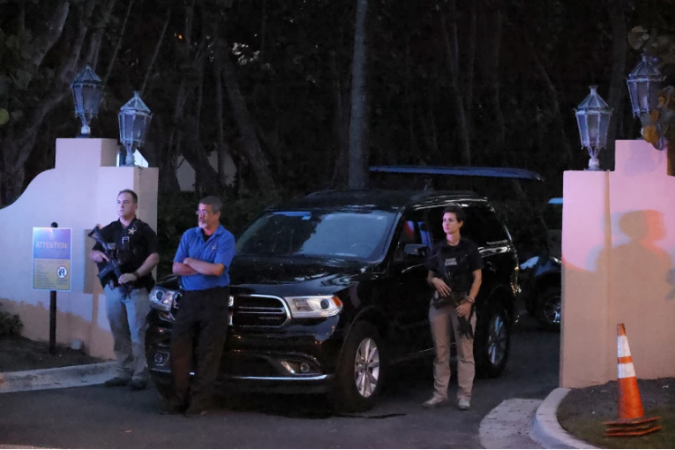
USA: People with knowledge of the situation said on Monday that the FBI searched Donald Trump's Mar-a-Lago estate as part of an investigation into whether he took classified documents from the White House to his Florida home. This action marks a dramatic and unprecedented increase in law enforcement scrutiny of the former president.
In a lengthy statement announcing the search, Trump claimed that agents had entered his home and opened a safe. He called their actions a "unannounced raid" and compared them to "prosecutorial misconduct."
The investigation into how confidential documents wound up in more than a dozen boxes discovered at Mar-a-Lago earlier this year has been intensified by the search. It happens as a separate grand jury investigation into attempts to rig the 2020 presidential election is ongoing, and it heightens the possibility of legal trouble for Trump as he prepares to run again.
These are dark times for our country, the president wrote, as Mar-a-Lago in Palm Beach, Florida, is currently the target of a large-scale FBI raid and occupation. "A President of the United States has never experienced anything like this before."
According to Trump's statement, "this unannounced raid on my home was not necessary or appropriate after working and cooperating with the relevant Government agencies."
Trump made no mention of the reason behind the search, but the Justice Department has been looking into possible classified information handling violations ever since the National Archives and Records Administration reported earlier this year that it had taken 15 boxes of records containing classified information from Mar-a-Lago. Trump should have turned over that information after leaving office, according to the National Archives, which requested an investigation from the Justice Department.
There are numerous federal laws that regulate the handling of sensitive government documents and classified records, including laws that make it illegal to remove such information and keep it in an unauthorised location. Federal officials seeking a search warrant must first show a judge that they have probable cause to believe that a crime has been committed, even though a search warrant does not imply that criminal charges are imminent or even expected.
Two people with knowledge of the situation who wish to remain anonymous because the matter is still under investigation said the search took place earlier on Monday and was connected to the records investigation. Agents were also checking Trump's estate to see if there were any additional presidential records or any sensitive documents.
Trump has in the past insisted that the release of presidential records occurred "in an ordinary and routine process." The National Archives wanted to confirm whether Donald Trump had any documents in his possession, according to his son Eric, who claimed to have spent the day with his father on Fox News on Monday night. Eric also said that he had spent the day with his father.
When asked how the papers got to Mar-a-Lago, Eric Trump responded that they were among the things that were removed from the White House during the "six hours" on Inauguration Day as the Bidens got ready to move in.
Eric Trump stated that his father "always kept press clippings." When he moved out of the White House, "He had boxes."
The recovery of the boxes raised concerns about Trump's compliance with presidential records laws enacted in the wake of the Watergate scandal in the 1970s, which demand that people who occupy the Oval Office keep records pertaining to official business.
The Archives had asked the Justice Department to look into Trump's methods back then.
According to a forthcoming book by New York Times reporter Maggie Haberman, White House staff frequently found paper wads clogging toilets, leading them to suspect Trump was attempting to get rid of specific documents.
A White House representative claimed that they were unaware of the action and directed any inquiries regarding the raid to the Justice Department, which would not comment. The House committee looking into the riot on January 6 also opted not to comment.
Trump referred to the search as a "weaponization of the Justice System, and an attack by Radical Left Democrats who desperately don't want me to run for President in 2024" in a social media post on Monday night.
There has never been a previous instance of a former president facing an FBI raid, even going back to the Watergate scandal, according to Thomas Schwartz, a history professor at Vanderbilt University who specialises in presidential history and writing. Schwartz pointed out that when Richard Nixon left office in 1974, he was not permitted to take any tapes or other materials with him, and that many of his papers were left behind in Washington for many years before being moved to his presidential library in California.
The Trump era was distinct, and this is a sign of that, according to Schwartz, author of "Henry Kissi
Anger and American Power: A Political Biography." "How Strange His Behavior Was."
Apart from the investigation, Trump is facing many legal issues. A separate investigation into Trump and his allies' attempts to reverse the results of the 2020 election, which sparked a January 6, 2021 riot at the US Capitol, is also gaining steam in Washington. Several former White House officials have been summoned by the grand jury.
Additionally, a district attorney in Fulton County, Georgia, is looking into possible attempts by Trump and his close friends to sabotage the election there, which was won by Democrat Joe Biden.
safety concerns increase after repeated shelling on a nuclear plant
FBI raids Donald Trump's house, alleges he brought 15 boxes of documents from White House
US Dept of Justice sues former Trump lawyer Peter Navarro